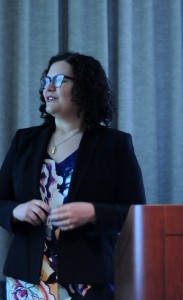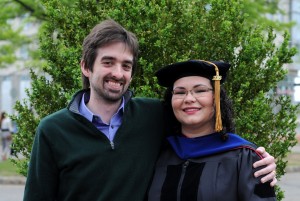[caption id="attachment_1573" align="alignleft" width="183"] At my thesis defense.[/caption]
At my thesis defense.[/caption]
I officially became Dr. Samantha Yost in May of last year. It was a bittersweet time as I was excited to be finishing but was struggling with imposter syndrome right up until the end. Successfully defending your dissertation and graduating is supposed to make you feel accomplished, isn’t it? As glad as I was to be finished with my overdue Ph.D., I was no closer to figuring out who I want to be when I ‘grow up’, and the constant barrage of, “We’re going forward with another candidate who is more qualified than you,” in response to job applications in the months following graduation certainly didn’t help my morale. So, in an effort to save you months of blows to your already-shot ego in the future, here are a five pieces of advice that would’ve helped me mitigate some of the post-graduation stress:
- Start early. iJOBS wasn’t around when I started graduate school, but I wish it had been. I didn’t know there were opportunities for Ph.D. scientists beyond bench-life whether academia or industry. Now I realize that had I started earlier, I could’ve geared my experiences and specialties towards other things I was interested in such as public policy. The earlier you start thinking about this and honing your skills, the better. Starting early also applies during the job search itself. Writing a dissertation can be a full-time job, but you need to make time for reaching out to potential postdoctoral advisors or future employers before you graduate.
- Try new things with an open mind. Go to iJOBS events that you aren’t sure you are interested in. Not only will you find out what kinds of options are available to you as a future Ph.D., you never know when a connection you’ve made will make an impact on your future. Join groups on campus, become a member of a professional society, or volunteer your time to something you’re genuinely passionate about (even outside of science). This leads right into my next tip...
- Be an active participant (aka NETWORK, NETWORK, NETWORK!). During my first year at Rutgers, I probably spoke to all of three other people in my class. Luckily, I made a good impression on one of those people and he played a role in helping me find my new job (I reiterate: you never know when connections will come through for you)! When I started going to iJOBS events, I took a seat in the back every time; iJOBS events are for you, not the industry panel, workshop instructor, or site visit tour guide, so get participating! In order to get the most out of both grad school and iJOBS events, you have to be active by asking questions, talking with the speakers, and being present and open to the opportunities around you. Get some business cards to pass out, perhaps, and make connections on LinkedIn. I promise you no one will judge you for being nervous when asking a question or awkwardness making small talk.
- Have a backup plan. This one is a little controversial, and probably up to the individual’s situation. I personally believe that it is smart to leave many avenues open for yourself. If you want to be a scientist, but you also happen to be a proficient writer, why shouldn’t that be a viable future option? Chances are you won’t land your dream job right out of grad school, but you’ll still need income. You can learn valuable skills to apply to your future dream job in other positions; being versatile is a good thing. I was lucky in that my P.I. was able to keep me as a postdoc after graduation until I could find a job, and although I do want to continue at the bench, I was also mentally prepared to take on editing and writing positions if they were offered.
- Seriously evaluate your priorities. Would you be willing to leave the country for your dream job? What are the visa requirements you will need to consider? Will you apply for contract positions or only permanent jobs? Do you want to live in the city or the country? What considerations do you need to make for your spouse or children? I got married in graduate school to a mechanical
[caption id="attachment_1571" align="alignright" width="300"]
 My husband and me. Now we're both Ph.D.s![/caption]
My husband and me. Now we're both Ph.D.s![/caption]engineering Ph.D. While our family is still just the two of us, it was important that my career goals not be hindered by his (and vice versa) and that we act as a true equal partnership. What is the best for your career right now may not be what is best for your family, and your priorities need to be laid out before opportunities present themselves. Big decisions are scary and stressful, but if you understand your needs they become much easier.
The future is in your hands, as distant as that may seem to some of you early-stage grad students. Taking the advice of alumni, peers, advisors, and your committee about the future will make the post-graduation transition much easier on yourself!